Infinite photos and videos for every Wiki article ·
Find something interesting to watch in seconds
Celebrities
Largest Empires
Wonders of Nature
Largest Palaces
Best Campuses
Kings of France
Wars and Battles
Rare Coins
Tallest Buildings
Recovered Treasures
Richest US Counties
Orders and Medals
History by Country
Great Cities
Animals
British Monarchs
Presidents
Ancient Marvels
World Banknotes
Great Museums
Crown Jewels
Great Artists
Supercars
Famous Castles
Countries of the World
Sports
more top lists






